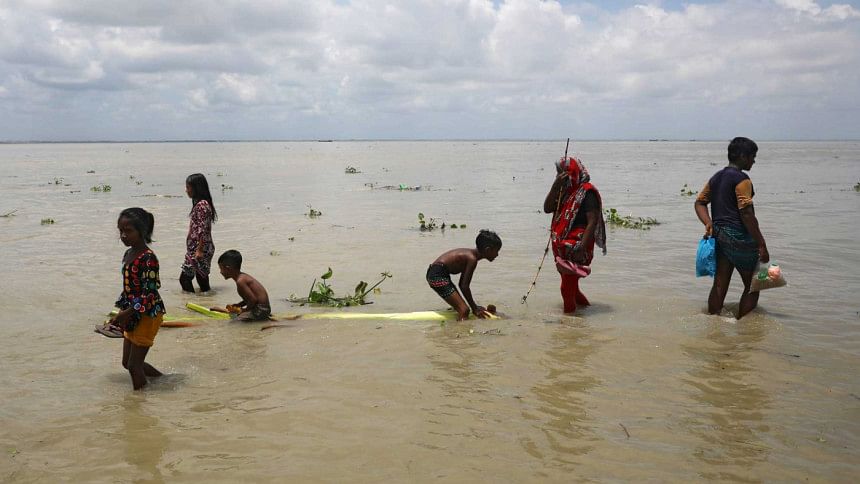Time to change the story of coastal women’s struggles

Maksura lived in Shyamnagar, in the coastal areas of Bangladesh. She graduated against all odds and dreamed of a future where she could work and apply her knowledge in real life. But she was unable to find a suitable opportunity, and instead was married off to a disabled and slightly less educated man. The man owned a small shrimp firm, but his business was being threatened by newer, wealthier entrants. So she wished to shape a better life for herself and her family. But everyone was awaiting news of her pregnancy. The pressure from her family and society kept mounting, and soon after her wedding, she decided to give in and have a baby.
Amid financial duress and a dwindling career, she conceived her first child at 28. As fate would have it, three months into her pregnancy, she lost the baby. As her husband wrestled with diminishing business opportunities in the heavily salinised area, Maksura found herself facing all sorts of social stigma. She decided to try for a child again; her world in tatters, Maksura knew that a baby was her ticket to peace and stability in the family. Unfortunately, this was not to be, as four months into her pregnancy, she miscarried again.
Maksura met with an NGO medical practitioner who instantly advised her some medication, food and a change of her source of drinking water, and to opt for treated water found a little further from her home by Friendship's water treatment plant. Maksura was finally able to give birth to a healthy baby.
Maksura's story reveals the research by the icddr,b, which found that women residing within 20km of the coastline and seven metres above sea level were 1.3 times more likely to suffer miscarriage than women residing further inland. According to the Soil Resource Development Institute (SRDI), salinity has been a problem since the early 1970s, and has increased around 26 percent in the last 35 years. However, salinity is not the only issue ailing Bangladeshi women's health and lives in general.
Women have assumed familial roles such as guardians, caregivers, homemakers, economisers, healthcare providers, teachers, and disciplinarians. A woman multitasks her way expertly in a household and plays all these roles with zeal; she has been doing so for hundreds of years now. More and more women have stepped outside for work in recent times. Regardless, they never did let go of the older responsibilities that they had internalised and inherited from society. Thus, they now have dual roles and, therefore, assume dual burdens.
Women in rural settings who are not working to earn do not fare much better either. They have also had to step up over time to take on a number of different roles to ensure the stability of their families. Oftentimes, as men venture outside their villages and countries in search of jobs, women stay behind to look after the children and the elderly. They find themselves in charge of bringing wood and dry leaves for fire, water for household needs, and food for their families. If it is a traditionally woman-led household, these roles are even starker. Even as a standalone job, water collection is difficult. If water collection points are far from a woman's place of residence, it becomes physically and mentally burdensome. As many as 68.3 million people lack access to safely managed drinking water in Bangladesh, while 103 million are deprived of safely managed sanitation facilities, according to a new Unicef-WHO report. Women and girls bear 90 percent of the responsibility of collecting water in Bangladesh, according to the World Bank.
As for providing their families with food security and nutrition, the primary solution for women is often to plant crops and vegetables in their respective homesteads, and invest in small-hold agriculture or diversity into sub-sectors like fish farming and forestry. It is worth noting that females lead 50-80 percent of food production around the world, but actually own very little land. Whether or not these ventures bring them an earning opportunity, they do help them provide a source of food and nutrition for their families. According to data obtained from FAO in 2018, 11 percent of small-scale fishers and almost half of all aquaculture workers around the world are women, and climate change could harm all of these women's livelihoods.
Women often miss out on critical weather safety from disasters. According to the Climate Change Profile Bangladesh (2018), in times of climate-related disasters (which are likely to happen more often in the future), women are hit harder than men. In the past, cyclones and floods have been associated with death rates for women five times higher than for men. Cyclone Gorky in 1991 had a death ratio of 14:1 with the heavier side being that of females, according to a study by the World Bank.
The Intergovernmental Panel on Climate Change (IPCC) recognises that one of the issues that can really exacerbate climate-related hazards is gender inequality, as workload, occupational hazards, psychological, physiological, and emotional stress, and mortality will all rise for women and girls. Even as the world tries to reduce carbon emissions, direct measures to ensure support for women are missing.
Laws, policies, and practical interpretation are very important to empower women. Most of the issues are cross-cutting, and to be able to sift and work through them, extensive gender-disaggregated data on the more marginalised and vulnerable groups of women, including girl children and the very old, is needed.
Climate change is not a gender-neutral concept, nor are the effects of it more lenient towards the disadvantaged female. However, the personal realisation for each one of us is that stories like Maksura's should not be repeated, and that each one of us should genuinely and positively intend to prepare a stronger future generation that does not fall victim to age-old prejudicial norms and practices.
Kazi Amdadul Hoque is a senior director at the NGO Friendship, working on strategic planning, climate action and development.

 For all latest news, follow The Daily Star's Google News channel.
For all latest news, follow The Daily Star's Google News channel. 



Comments